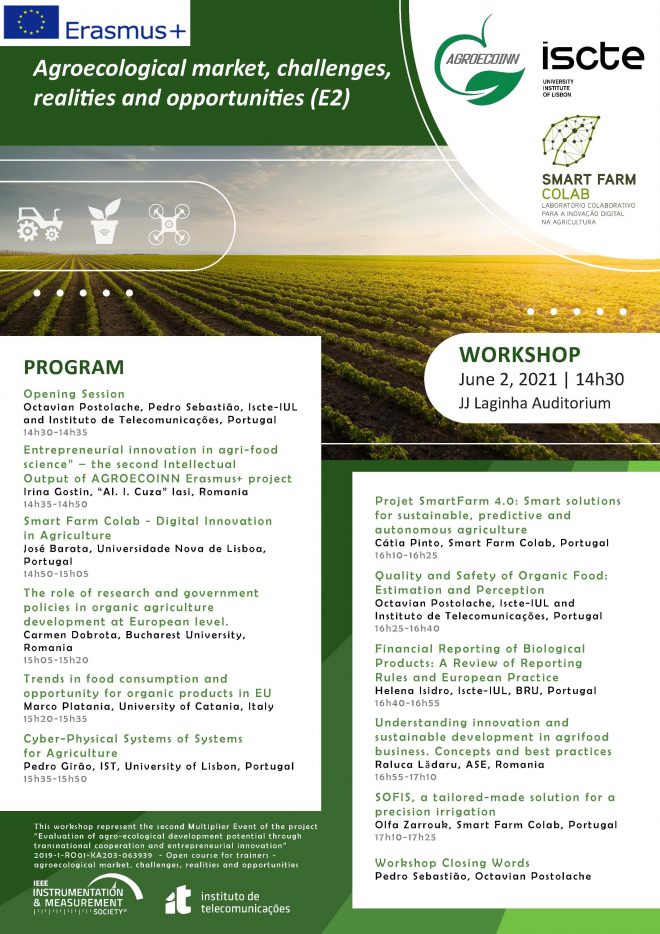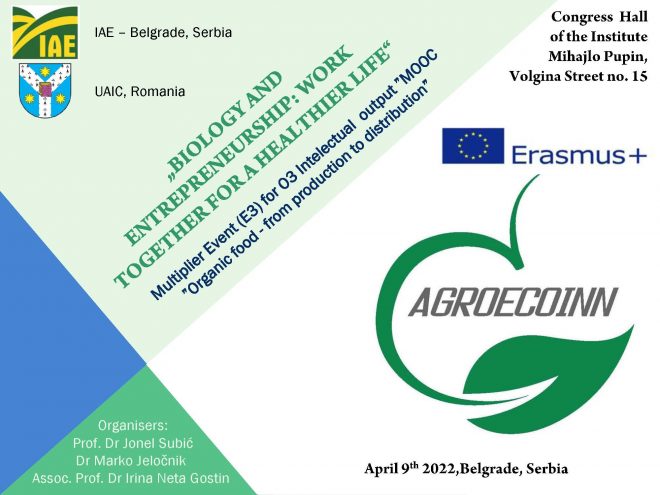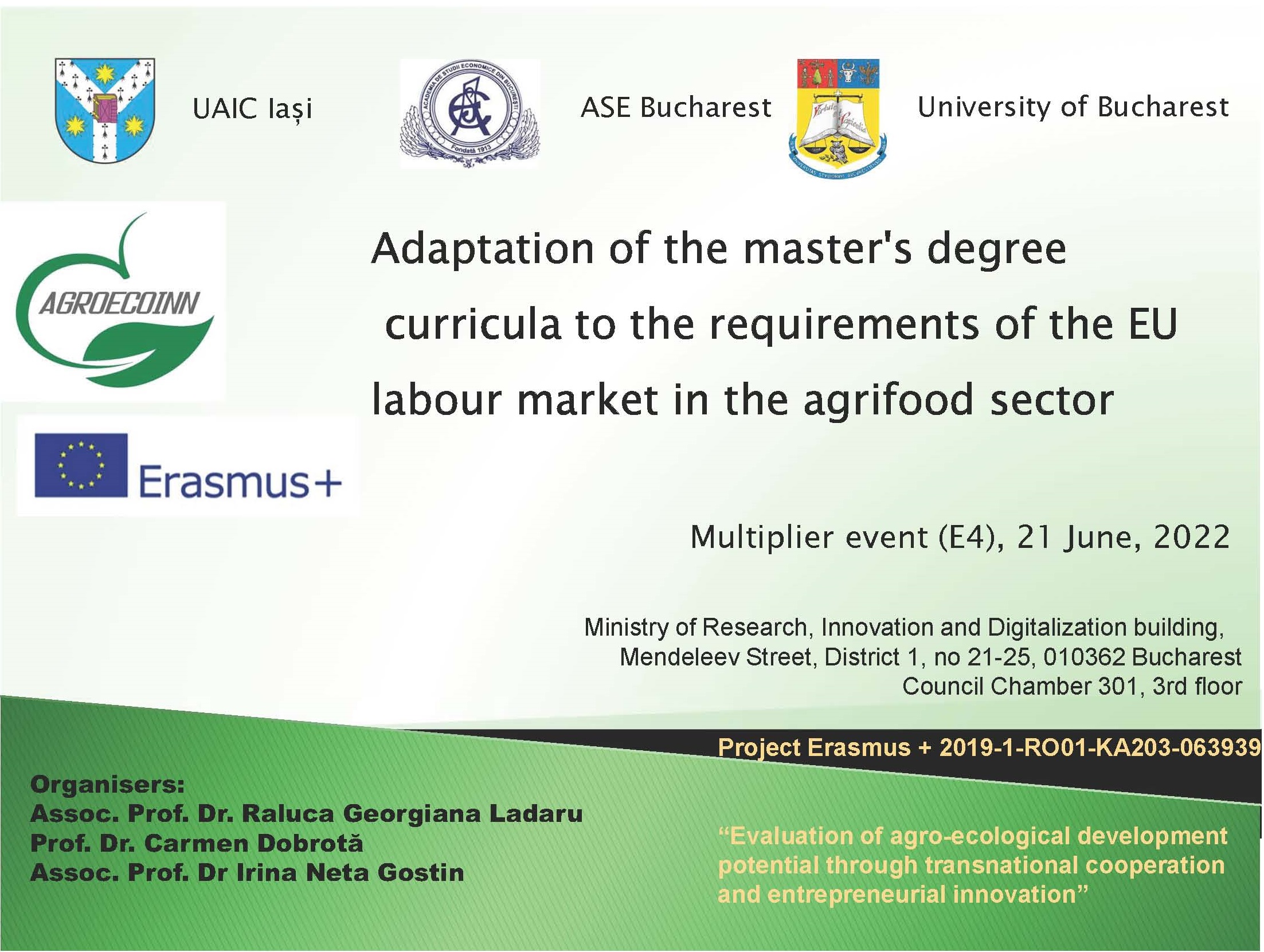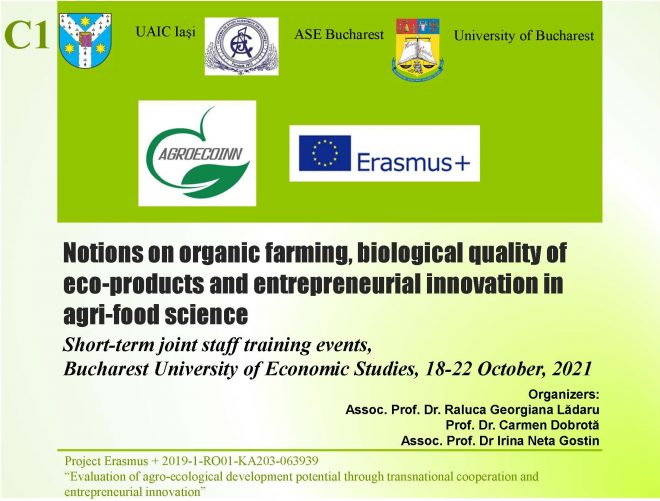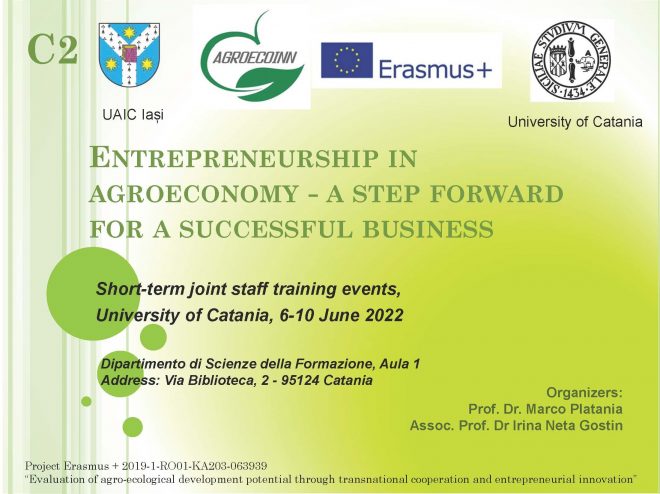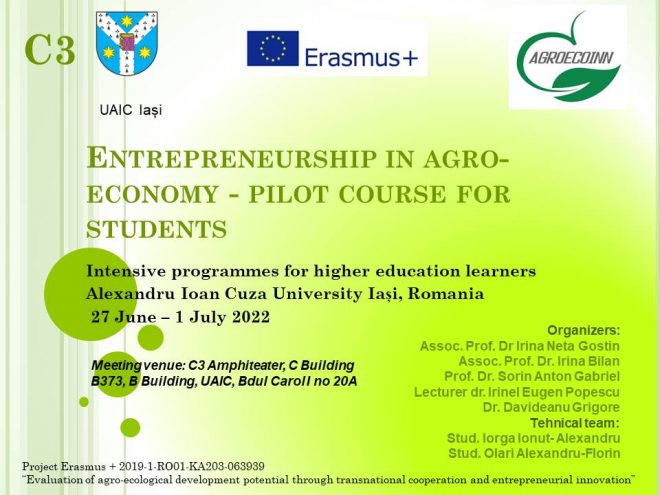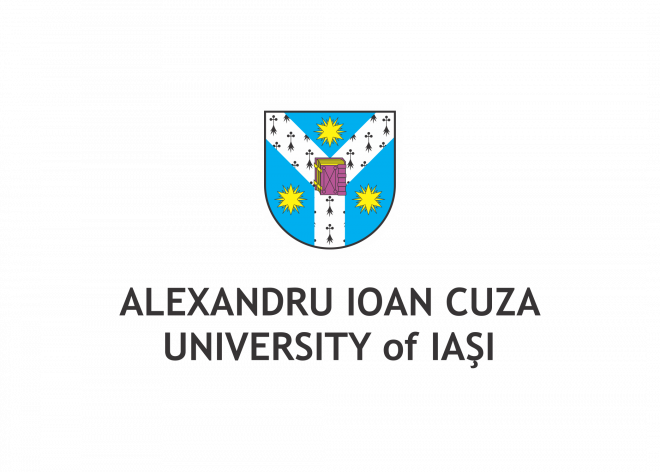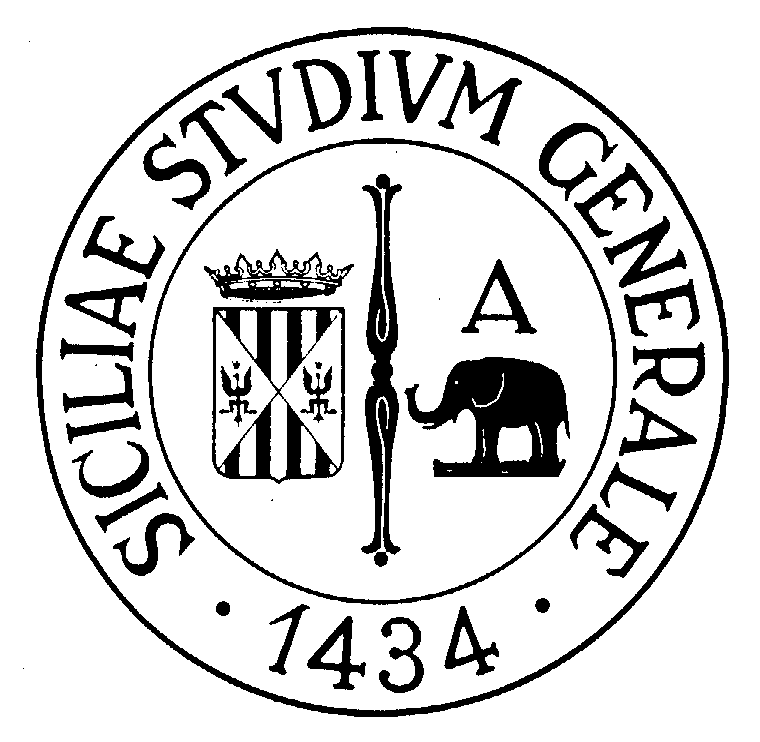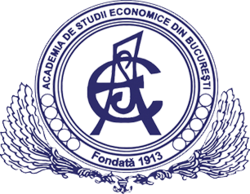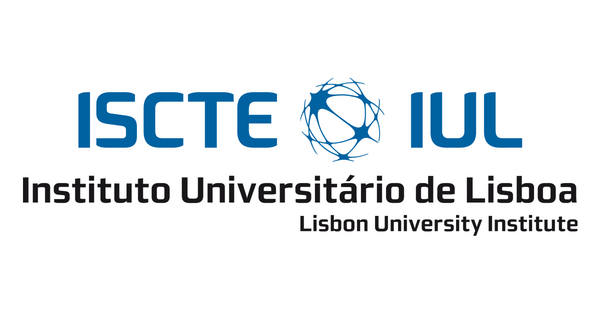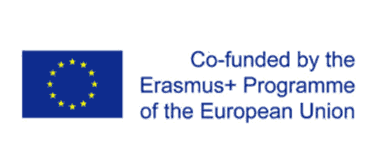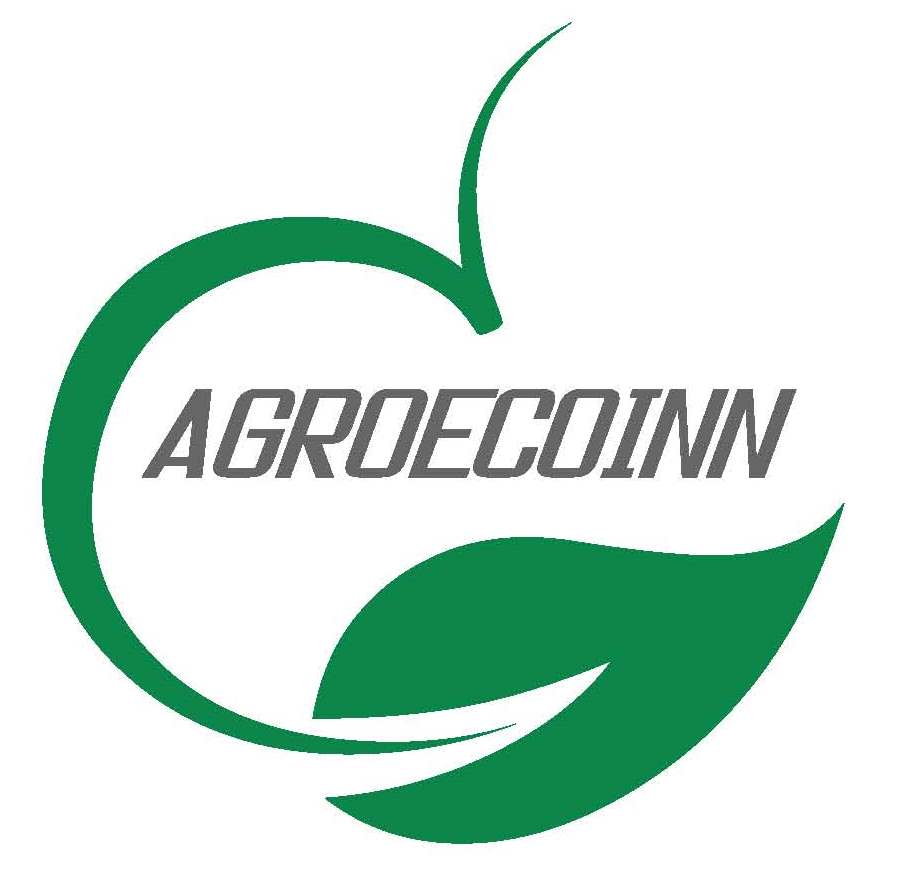
Evaluation of agro-ecological development potential through transnational cooperation and entrepreneurial innovation (2019-1-RO01-KA203-063939)
Economies and societies are seen as embedded parts of the biosphere (FOOD 2030 Future-Proofing our Food systems through Research and Innovation https://fit4food2030.eu/ ); we can add that science is the element that brings all three together.
This moves discussions away from the current sectoral approach – where social, economic, and ecological development are seen as separate parts – towards an economy serving society in the safe space of the planet. Using this model we can argue that all the sustainable development goals are directly or indirectly connected to sustainable and healthy food.
The main objective is to improve curricula to meet student learning needs in line with labour market requirements, in economic, biological and agricultural fields.
The target group will be represented by professors, researchers and students (undergraduate students, master and doctoral students) from partner institutions.
The specific objectives are:
- to improve the skills of teachers and researchers from partners institutions through the training sessions that will take place in the project;
- to outline a group of young students with international experience to work as a future specialist in the fields of organic farming and eco-entrepreneurship;
- to allow a larger group of students from host countries to benefit from the expertise of teachers from partner countries;
- to encourage universities to improve the content of masters programs on the basis of information gathered in exchanges of good practices between the involved partners. One of the outputs of the project is represented specifically by a protocol that aims to harmonize the curricula offered to students within the education providers.
The transnational dimension is essential in achieving this partnership: each partner will bring into the project its expertise and the regional particularities (from the originate partners countries) that are very important in the field. The level of organic farming development, the impact on society and the level of training in the field are significantly different in the participating countries.
The follows results correspond to the intellectual outputs indicated in the project:
- O1 – ”Course for trainers – Organic farming, eco-market and their capitalization through the entrepreneurial initiative”;
- O2 –”Course for trainers – Entrepreneurial innovation in Agri-food science”;
- O3-MOOC ”Organic food – from production to distribution”;
- O4 – ”Protocol for adapting the partner universities curricula”.
The AGROECOINN project impacts will be measured based on a variety of qualitative and quantitative indicators.
Impact measurement by qualitative indicators:
First of all, the impact will be measured using feedback tools on individuals and institutions involved in training and dissemination activities regarding the evaluation of agro-ecological development potential.
Impact measurement by quantitative indicators:
Depending on each output, the following indicators will be quantified:
- Number of produced text pages, the number of courses hours, number of course modules, number of proposed changes/master program, number of institutions that will apply the protocol;
- Participation numbers of teachers/trainers/researchers in C1 and C2 intensive training weeks;
- Number of students attending the intensive learning session (C3);
- Website traffic statistics.
Dissemination of the results of the AGROECOINN project will take place in two stages – an initial one, during its deployment, through the E1-E4 multiplier events that will take place after the delivery of each Intellectual Output (O1-O4). In this case, the target group will be represented by the participants in the project from the partners, but also by a larger number of interested persons (teachers, researchers, students, stakeholders) from the partner universities as well as from other universities from the same city and nearby.
In the second phase, after the completion of the project, the results will be made available free of charge for the universities with which the partners have collaborative relations within the European Union.
Activities plan
O1-Course for trainers – Organic farming, eco-market and their capitalization through the entrepreneurial initiative
O2-Course for trainers – Entrepreneurial innovation in Agri-food science
O3-MOOC ”Organic food -from production to distribution”
O4-Protocol for adapting the partner universities curricula
| Intellectual Outputs | |||
| ID | Output Title | Category of Staff | |
| O1 | Course for trainers – Organic farming, eco-market and their capitalization through the entrepreneurial initiative | Technicians | |
| Teachers/Trainers/Researchers | |||
| O2 | Course for trainers – Entrepreneurial innovation in Agri-food science | Technicians | |
| Teachers/Trainers/Researchers | |||
| O3 | MOOC ”Organic food -from production to distribution” | Technicians | |
| Teachers/Trainers/Researchers | |||
| O4 | Protocol for adapting the partner universities curricula | Teachers/Trainers/Researchers | |
| Transnational Projects Meetings | |||
| ID | Meeting Title | Country | No. of participants |
| 1. | Kick-off meeting | Alexandru Ioan Cuza University of Iasi (Romania) | 10 |
| 2. | The second partner meeting | University of Catania (Italy) | 10 |
| 3. | The third partner meeting | University Institute of Lisbon (Portugal) | 10 |
| 4. | The fourth partener meeting | Institute of Agricultural Economics Belgrad (Serbia) | 10 |
| 5. | Final partner meeting | Bucharest University of Economic Studies (Romania) | 10 |
|
Multiplier Events |
||||
| ID | Event Title | Country of Venue | ||
| E1 | Organic farming – the premise for a healthy diet; current trends in the agricultural market
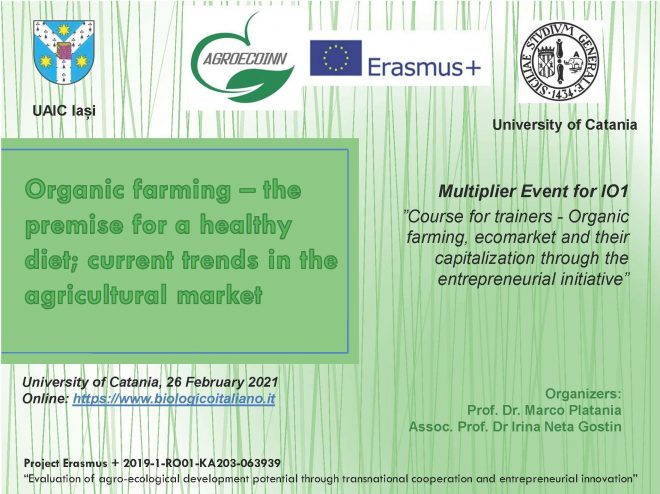 |
Italy | ||
| E2 | Open course for trainers – agroecological market, challenges, realities and opportunities | Portugal | ||
| E3 | Biology and intrepreneurship – work together for a healthier life | Serbia | ||
| E4 | Adaptation of the master’s degree curricula to the requirements of the EU labour market in the agrifood sector | Romania | ||
Learning, Teaching, Training Activities |
|
| ID | Activity Type |
| C1 |
Short-term joint staff training events Bucharest University of Economic Studies, 18–22 October, 2021 |
| C2 |
Short-term joint staff training events University of Catania, Dipartimento di Scienze della Formazione, 6-10 June 2022 Entrepreneurship in agro-economy – a step forward for a successful business |
| C3 |
Intensive programmes for higher education learners Alexandru Ioan Cuza University of Iași, Romania, 27 June – 1 July 2022 Entrepreneurship in agro-economy – pilot course for students |

